By Tomash Dabrowski · Tuesday, March 27, 2012 As an occasional feature on TELOSscope, we highlight a past Telos article whose critical insights continue to illuminate our thinking and challenge our assumptions. Today, Tomash Dabrowski looks at Max Horkheimer’s “Materialism and Morality,” from Telos 69 (Fall 1986).
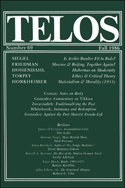 In 1933, the rise of National Socialism had terminated the Frankfurt School’s residency in Germany, and “Materialism and Morality” marks the last contribution by Max Horkheimer to the Institute’s journal, the Zeitschrift für Sozialforschung, while still located in Frankfurt. In this respect, the present essay is a macrocosm of the development of the thought of the Frankfurt School at the cusp of exile. Key concepts in Horkheimer’s more widely known mature work already germinate in “Materialism and Morality,” but the essay’s unique position in his individual intellectual development likewise straddles the ongoing process of elaborating a cohesive sociological vision for the institute. The still nascent idea of a “Critical Theory,” which is now synonymous with the school, had yet to wait four years to be coined by Horkheimer; indeed “Materialism and Morality” is part of a still continuing clarification of what an interdisciplinary critical method might look like in application. In 1933, the rise of National Socialism had terminated the Frankfurt School’s residency in Germany, and “Materialism and Morality” marks the last contribution by Max Horkheimer to the Institute’s journal, the Zeitschrift für Sozialforschung, while still located in Frankfurt. In this respect, the present essay is a macrocosm of the development of the thought of the Frankfurt School at the cusp of exile. Key concepts in Horkheimer’s more widely known mature work already germinate in “Materialism and Morality,” but the essay’s unique position in his individual intellectual development likewise straddles the ongoing process of elaborating a cohesive sociological vision for the institute. The still nascent idea of a “Critical Theory,” which is now synonymous with the school, had yet to wait four years to be coined by Horkheimer; indeed “Materialism and Morality” is part of a still continuing clarification of what an interdisciplinary critical method might look like in application.
Continue reading →
By Juan Carlos Donado · Thursday, March 15, 2012 As an occasional feature on TELOSscope, we highlight a past Telos article whose critical insights continue to illuminate our thinking and challenge our assumptions. Today, Juan Carlos Donado looks at Paul Piccone’s “Science, Art and Revolution: An Introduction to Galileo as a Poet,” from Telos 4 (Fall 1969).
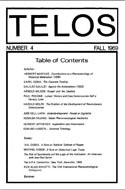 Even if Paul Piccone in fact mistakenly attributes the poem Contro Gli Aristotelici to Galileo—as scholars such as Charles B. Schmitt claim—the conclusion remains invariably the same. Piccone, of course, is not alone in this: the mistake originated in an early article written by the great Galilean scholar Antonio Favaro (1869–1922), responsible for the colossal twenty-volume edition of Galileo’s Opere. Favaro himself corrected the mistake one year later in a much lesser known article, but in print the attribution was already made and Jacopo Soldani’s satire, for years, was adopted by Galileo’s pen. Even if Paul Piccone in fact mistakenly attributes the poem Contro Gli Aristotelici to Galileo—as scholars such as Charles B. Schmitt claim—the conclusion remains invariably the same. Piccone, of course, is not alone in this: the mistake originated in an early article written by the great Galilean scholar Antonio Favaro (1869–1922), responsible for the colossal twenty-volume edition of Galileo’s Opere. Favaro himself corrected the mistake one year later in a much lesser known article, but in print the attribution was already made and Jacopo Soldani’s satire, for years, was adopted by Galileo’s pen.
Continue reading →
By Juan Carlos Donado · Monday, February 13, 2012 As an occasional feature on TELOSscope, we highlight a past Telos article whose critical insights continue to illuminate our thinking and challenge our assumptions. Today, Juan Carlos Donado looks at Alberto Buela’s “The Katechon and the Future of Latin America,” from Telos 126 (Winter 2003).
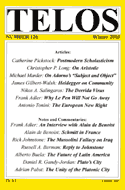 A recent Colombian periodical announced the news: by the end of 2011, the country’s capital, Bogotá, reported an unemployment rate, at least by official accounts, 0.3% lower than that of the United States. The headlines, mediatic as they may intend, aim at fixing in print the dynamics of a continental reality: while European and American economies struggle with unprecedented crises, at least eight Latin American economies closed the year, according to the Centre for Latin American Studies (CESLA), with above average growth. A recent Colombian periodical announced the news: by the end of 2011, the country’s capital, Bogotá, reported an unemployment rate, at least by official accounts, 0.3% lower than that of the United States. The headlines, mediatic as they may intend, aim at fixing in print the dynamics of a continental reality: while European and American economies struggle with unprecedented crises, at least eight Latin American economies closed the year, according to the Centre for Latin American Studies (CESLA), with above average growth.
Continue reading →
By Katherine McGinity · Thursday, February 9, 2012 As an occasional feature on TELOSscope, we highlight a past Telos article whose critical insights continue to illuminate our thinking and challenge our assumptions. Today, Katherine McGinity looks at Michael Mack’s “Richard Wagner and the Trajectory of Transcendental Philosophy,” from Telos 123 (Spring 2002).
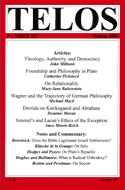 Michael Mack’s “Richard Wagner and the Trajectory of Transcendental Philosophy” explores the differing brands of anti-Semitism in Kant, Hegel, Feuerbach, and Schopenhauer, and explains how their scrutiny of Jews as a hindrance to society was radicalized by Richard Wagner. Mack details how each philosopher’s particular form of anti-Semitism fed into Wagner’s social-political writings as well as his “total works of art.” By investigating the concepts put forth by Wagner’s philosophical predecessors, one can more fully understand how a radicalized version of Kantian moral philosophy infiltrated German national culture through the composer’s art. Mack specifically addresses how these ideas manifested in Wagner’s Ring Cycle. Michael Mack’s “Richard Wagner and the Trajectory of Transcendental Philosophy” explores the differing brands of anti-Semitism in Kant, Hegel, Feuerbach, and Schopenhauer, and explains how their scrutiny of Jews as a hindrance to society was radicalized by Richard Wagner. Mack details how each philosopher’s particular form of anti-Semitism fed into Wagner’s social-political writings as well as his “total works of art.” By investigating the concepts put forth by Wagner’s philosophical predecessors, one can more fully understand how a radicalized version of Kantian moral philosophy infiltrated German national culture through the composer’s art. Mack specifically addresses how these ideas manifested in Wagner’s Ring Cycle.
Continue reading →
By Charles Kollmer · Thursday, January 19, 2012 As an occasional feature on TELOSscope, we highlight a past Telos article whose critical insights continue to illuminate our thinking and challenge our assumptions. Today, Charles Kollmer looks at Stephanie Frank’s “Re-imagining the Public Sphere: Malebranche, Schmitt’s Hamlet, and the Lost Theater of Sovereignty,” from Telos 153 (Winter 2010).
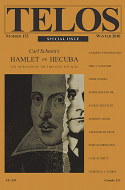
In “Re-imagining the Public Sphere: Malebranche, Schmitt’s Hamlet, and the Lost Theater of Sovereignty,” Stephanie Frank outlines a compelling approach to Carl Schmitt’s complex oeuvre. She sets out to rectify a common mistake made in existing treatments of Schmitt; in studies of Schmitt’s early work Roman Catholicism and Political Form (1923), scholars tend to rely on a later work, Constitutional Theory (1928), as an explanatory crutch. Both texts model representation, but a conflation of their respective models obscures how Schmitt’s project changes between the works. As a corrective, Frank traces the nuances of Roman Catholicism‘s model back to the influence of seventeenth-century theologian Malebranche, who in turn influenced the eighteenth-century revolutionary Abbé Sieyès. By grounding Roman Catholicism in this historical context, Frank not only sidesteps the circularity of her colleagues’ interpretations but also lays the groundwork for a persuasive reading of Schmitt’s turn to aesthetics in Hamlet or Hecuba (1956).
Continue reading →
By Emelie Whiting · Thursday, December 8, 2011 As an occasional feature on TELOSscope, we highlight a past Telos article whose critical insights continue to illuminate our thinking and challenge our assumptions. Today, Emelie Whiting looks at Mark W. Rectanus’s “Performing Knowledge: Cultural Discourses, Knowledge Communities, and Youth Culture,” from Telos 150 (Spring 2010).
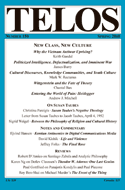 Academic discourse in the twenty-first century has undergone profound transformations. With new methods of knowledge production and consumption brought about by an increase in electronic resources and databases as well as the advent of social networking, there have been widespread changes in scholarly publishing, centers of knowledge, and knowledge communities. In his article “Performing Knowledge: Cultural Discourses, Knowledge Communities, and Youth Culture,” Mark W. Rectanus provides a compelling look at the shift in the significance and acquisition of knowledge resulting from changes in the publishing industry, literary reception, and access to different kinds of information as they stand in relation to a new “pedagogy of media”—a new way of teaching and learning in our technologically advanced age. Rectanus asserts that such developments require a revised conception of what it means to acquire knowledge as well as what constitutes scholarly knowledge. Academic discourse in the twenty-first century has undergone profound transformations. With new methods of knowledge production and consumption brought about by an increase in electronic resources and databases as well as the advent of social networking, there have been widespread changes in scholarly publishing, centers of knowledge, and knowledge communities. In his article “Performing Knowledge: Cultural Discourses, Knowledge Communities, and Youth Culture,” Mark W. Rectanus provides a compelling look at the shift in the significance and acquisition of knowledge resulting from changes in the publishing industry, literary reception, and access to different kinds of information as they stand in relation to a new “pedagogy of media”—a new way of teaching and learning in our technologically advanced age. Rectanus asserts that such developments require a revised conception of what it means to acquire knowledge as well as what constitutes scholarly knowledge.
Continue reading →
|
|
 In 1933, the rise of National Socialism had terminated the Frankfurt School’s residency in Germany, and “Materialism and Morality” marks the last contribution by Max Horkheimer to the Institute’s journal, the Zeitschrift für Sozialforschung, while still located in Frankfurt. In this respect, the present essay is a macrocosm of the development of the thought of the Frankfurt School at the cusp of exile. Key concepts in Horkheimer’s more widely known mature work already germinate in “Materialism and Morality,” but the essay’s unique position in his individual intellectual development likewise straddles the ongoing process of elaborating a cohesive sociological vision for the institute. The still nascent idea of a “Critical Theory,” which is now synonymous with the school, had yet to wait four years to be coined by Horkheimer; indeed “Materialism and Morality” is part of a still continuing clarification of what an interdisciplinary critical method might look like in application.
In 1933, the rise of National Socialism had terminated the Frankfurt School’s residency in Germany, and “Materialism and Morality” marks the last contribution by Max Horkheimer to the Institute’s journal, the Zeitschrift für Sozialforschung, while still located in Frankfurt. In this respect, the present essay is a macrocosm of the development of the thought of the Frankfurt School at the cusp of exile. Key concepts in Horkheimer’s more widely known mature work already germinate in “Materialism and Morality,” but the essay’s unique position in his individual intellectual development likewise straddles the ongoing process of elaborating a cohesive sociological vision for the institute. The still nascent idea of a “Critical Theory,” which is now synonymous with the school, had yet to wait four years to be coined by Horkheimer; indeed “Materialism and Morality” is part of a still continuing clarification of what an interdisciplinary critical method might look like in application.  Even if Paul Piccone in fact mistakenly attributes the poem Contro Gli Aristotelici to Galileo—as scholars such as Charles B. Schmitt claim—the conclusion remains invariably the same. Piccone, of course, is not alone in this: the mistake originated in an early article written by the great Galilean scholar Antonio Favaro (1869–1922), responsible for the colossal twenty-volume edition of Galileo’s Opere. Favaro himself corrected the mistake one year later in a much lesser known article, but in print the attribution was already made and Jacopo Soldani’s satire, for years, was adopted by Galileo’s pen.
Even if Paul Piccone in fact mistakenly attributes the poem Contro Gli Aristotelici to Galileo—as scholars such as Charles B. Schmitt claim—the conclusion remains invariably the same. Piccone, of course, is not alone in this: the mistake originated in an early article written by the great Galilean scholar Antonio Favaro (1869–1922), responsible for the colossal twenty-volume edition of Galileo’s Opere. Favaro himself corrected the mistake one year later in a much lesser known article, but in print the attribution was already made and Jacopo Soldani’s satire, for years, was adopted by Galileo’s pen.  A recent Colombian periodical announced the news: by the end of 2011, the country’s capital, Bogotá, reported an unemployment rate, at least by official accounts, 0.3% lower than that of the United States. The headlines, mediatic as they may intend, aim at fixing in print the dynamics of a continental reality: while European and American economies struggle with unprecedented crises, at least eight Latin American economies closed the year, according to the Centre for Latin American Studies (CESLA), with above average growth.
A recent Colombian periodical announced the news: by the end of 2011, the country’s capital, Bogotá, reported an unemployment rate, at least by official accounts, 0.3% lower than that of the United States. The headlines, mediatic as they may intend, aim at fixing in print the dynamics of a continental reality: while European and American economies struggle with unprecedented crises, at least eight Latin American economies closed the year, according to the Centre for Latin American Studies (CESLA), with above average growth.  Michael Mack’s “Richard Wagner and the Trajectory of Transcendental Philosophy” explores the differing brands of anti-Semitism in Kant, Hegel, Feuerbach, and Schopenhauer, and explains how their scrutiny of Jews as a hindrance to society was radicalized by Richard Wagner. Mack details how each philosopher’s particular form of anti-Semitism fed into Wagner’s social-political writings as well as his “total works of art.” By investigating the concepts put forth by Wagner’s philosophical predecessors, one can more fully understand how a radicalized version of Kantian moral philosophy infiltrated German national culture through the composer’s art. Mack specifically addresses how these ideas manifested in Wagner’s Ring Cycle.
Michael Mack’s “Richard Wagner and the Trajectory of Transcendental Philosophy” explores the differing brands of anti-Semitism in Kant, Hegel, Feuerbach, and Schopenhauer, and explains how their scrutiny of Jews as a hindrance to society was radicalized by Richard Wagner. Mack details how each philosopher’s particular form of anti-Semitism fed into Wagner’s social-political writings as well as his “total works of art.” By investigating the concepts put forth by Wagner’s philosophical predecessors, one can more fully understand how a radicalized version of Kantian moral philosophy infiltrated German national culture through the composer’s art. Mack specifically addresses how these ideas manifested in Wagner’s Ring Cycle. 
 Academic discourse in the twenty-first century has undergone profound transformations. With new methods of knowledge production and consumption brought about by an increase in electronic resources and databases as well as the advent of social networking, there have been widespread changes in scholarly publishing, centers of knowledge, and knowledge communities. In his article “Performing Knowledge: Cultural Discourses, Knowledge Communities, and Youth Culture,” Mark W. Rectanus provides a compelling look at the shift in the significance and acquisition of knowledge resulting from changes in the publishing industry, literary reception, and access to different kinds of information as they stand in relation to a new “pedagogy of media”—a new way of teaching and learning in our technologically advanced age. Rectanus asserts that such developments require a revised conception of what it means to acquire knowledge as well as what constitutes scholarly knowledge.
Academic discourse in the twenty-first century has undergone profound transformations. With new methods of knowledge production and consumption brought about by an increase in electronic resources and databases as well as the advent of social networking, there have been widespread changes in scholarly publishing, centers of knowledge, and knowledge communities. In his article “Performing Knowledge: Cultural Discourses, Knowledge Communities, and Youth Culture,” Mark W. Rectanus provides a compelling look at the shift in the significance and acquisition of knowledge resulting from changes in the publishing industry, literary reception, and access to different kinds of information as they stand in relation to a new “pedagogy of media”—a new way of teaching and learning in our technologically advanced age. Rectanus asserts that such developments require a revised conception of what it means to acquire knowledge as well as what constitutes scholarly knowledge. 

